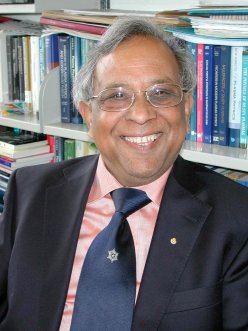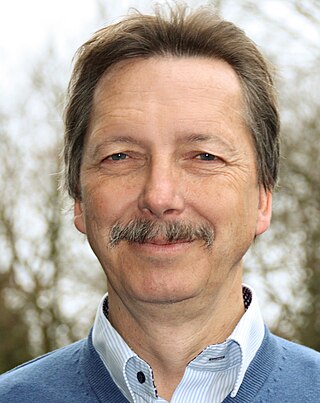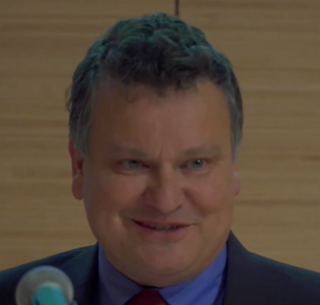Related Research Articles

Bruce Allen is an American physicist and director of the Max Planck Institute for Gravitational Physics in Hannover Germany and leader of the Einstein@Home project for the LIGO Scientific Collaboration. He is also a physics professor at the University of Wisconsin–Milwaukee and the initiator / project leader of smartmontools hard disk utility.

The Max Planck Institute for Dynamics and Self-Organization in Göttingen, Germany, is a research institute for investigations of complex non-equilibrium systems, particularly in physics and biology.

Peter Zoller is a theoretical physicist from Austria. He is professor at the University of Innsbruck and works on quantum optics and quantum information and is best known for his pioneering research on quantum computing and quantum communication and for bridging quantum optics and solid state physics.

The Max-Planck-Institute of Quantum Optics is a part of the Max Planck Society which operates 87 research facilities in Germany.
Matthias Steinmetz is a German astronomer and astrophysicist. He is director of the Astrophysical Institute Potsdam (AIP) and professor at the University of Potsdam.
Paul Lyon Houston is Professor Emeritus of Chemistry at Cornell University and Professor Emeritus of Chemistry and Biochemistry at the Georgia Institute of Technology.
Theo Geisel is a German physicist. Geisel is a director at the Max Planck Institute for Dynamics and Self-Organization and professor of theoretical physics at the University of Göttingen. His research is primarily concerned with the behavior of complex systems ranging from theoretical investigations in quantum chaos to nonlinear phenomena occurring in the brain.

Padma Kant Shukla was a distinguished Professor and first International Chair of the Physics and Astronomy Department of Ruhr-University Bochum in Germany. He was also the director of the International Centre for Advanced Studies in Physical Sciences at Ruhr-University Bochum. He held a PhD in physics from Banaras Hindu University in Varanasi, India and a second doctorate in Theoretical Plasma Physics from Umeå University in Sweden.
Stephan Herminghaus is a German physicist. He received a PhD in Physics from the University of Mainz in 1989. His postdoctoral stay was at the IBM Research Center in San Jose, California (USA), in 1990. He completed his habilitation at the University of Konstanz in 1994 and was the head of an independent research group at the MPI for Colloids and Interfaces, Berlin, from 1996 until 1999. He then became a full professor at the University of Ulm from 1999 until 2003. Since 2003, he has been a director at the Max Planck Institute for Dynamics and Self-Organization, Göttingen. Since 2005, he has an additional appointment as an adjunct professor at the University of Göttingen. Further, he was appointed as Professeur Invité at Université Paris VI for the winter term 2006/07.

Thomas K. Henning is a German astrophysicist. He was a director at the Max Planck Institute for Astronomy between 2001 and 2024. Henning is an expert in the field of star and planet formation.
Lars Bildsten is an American astrophysicist, best known for his work on the physics of white dwarfs and their explosions as Type Ia supernovae. He is the sixth director of the Kavli Institute for Theoretical Physics at the University of California, Santa Barbara (UCSB) and a professor in the UCSB Physics Department.

Thomas Henzinger is an Austrian computer scientist, researcher, and former president of the Institute of Science and Technology, Austria.
Bianca Dittrich is a German theoretical physicist known for her contributions to loop quantum gravity and the spin foam approach to quantum gravity. She has been a faculty member at Perimeter Institute for Theoretical Physics in Waterloo, Ontario, Canada since 2012. She is also currently an adjunct professor at the University of Guelph and the University of Waterloo.
Claudia Felser is a German solid state chemist and materials scientist. She is currently a director of the Max Planck Institute for Chemical Physics of Solids. Felser was elected as a member into the National Academy of Engineering in 2020 for the prediction and discovery of engineered quantum materials ranging from Heusler compounds to topological insulators.
Kurt Kremer is a German physicist.

Petra Schwille is a German professor and a researcher in the area of biophysics. Since 2011, she has been a director of the Department of Cellular and Molecular Biophysics at the Max Planck Institute for Biochemistry in Martinsried, Germany. She is known for her ground-laying work in the field of fluorescence cross-correlation spectroscopy, and numerous contributions on model membranes. Her current research focuses around bottom-up approaches to building an artificial cell within a broader area of synthetic biology. In 2010, Schwille received the Gottfried Wilhelm Leibniz Prize.
J. C. Séamus Davis is an Irish physicist whose research explores the world of macroscopic quantum physics. Davis concentrates upon the fundamental physics of exotic states of electronic, magnetic, atomic and space-time quantum matter. A specialty is development of innovative instrumentation to allow direct atomic-scale visualization or perception of the quantum many-body phenomena that are characteristic of these states.

Albert Stolow is a Canadian physicist. He is the Canada Research Chair in Molecular Photonics, full professor of chemistry & biomolecular sciences and of physics, and a member of the Ottawa Institute for Systems Biology at the University of Ottawa. He is the founder and an ongoing member of the Molecular Photonics Group at the National Research Council of Canada. He is adjunct professor of Chemistry and of Physics at Queen's University in Kingston, and a Graduate Faculty Scholar in the department of physics, University of Central Florida and a Fellow of the Max-Planck-uOttawa Centre for Extreme and Quantum Photonics. In 2008, he was elected a Fellow in the American Physical Society, nominated by its Division of Chemical Physics in 2008, for contributions to ultrafast laser science as applied to molecular physics, including time-resolved studies of non-adiabatic dynamics in excited molecules, non-perturbative quantum control of molecular dynamics, and dynamics of polyatomic molecules in strong laser fields. In 2008, Stolow won the Keith Laidler Award of the Canadian Society for Chemistry, for a distinguished contribution to the field of physical chemistry, recognizing early career achievement. In 2009, he was elected a Fellow of the Optical Society of America for the application of ultrafast optical techniques to molecular dynamics and control, in particular, studies of molecules in strong laser fields and the development of new methods of optical quantum control. In 2013, he was awarded the Queen Elizabeth II Diamond Jubilee Medal (Canada). In 2017, Stolow was awarded the Earle K. Plyler Prize for Molecular Spectroscopy and Dynamics of the American Physical Society for the development of methods for probing and controlling ultrafast dynamics in polyatomic molecules, including time-resolved photoelectron spectroscopy and imaging, strong field molecular ionization, and dynamic Stark quantum control. In 2018, Stolow was awarded the John C. Polanyi Award of the Canadian Society for Chemistry “for excellence by a scientist carrying out research in Canada in physical, theoretical or computational chemistry or chemical physics”. In 2020, he became Chair of the Division of Chemical Physics of the American Physical Society. His group's research interests include ultrafast molecular dynamics and quantum control, time-resolved photoelectron spectroscopy and imaging, strong field & attosecond physics of polyatomic molecules, and coherent non-linear optical microscopy of live cells/tissues, materials and geological samples. In 2020, Stolow launched a major new high power ultrafast laser facility at the University of Ottawa producing high energy, phase-controlled few-cycle pulses of 2 micron wavelength at 10 kHz repetition rate. These are used for High Harmonic Generation to produce bright ultrafast Soft X-ray pulses for a new Ultrafast Xray Science Laboratory.
Ángel Rubio is a Spanish theoretical physicist and director at the Max Planck Institute for the Structure and Dynamics of Matter in Hamburg. Rubio is also a Distinguished Research Scientist in computational quantum physics at the Simons Foundation's Flatiron Institute in New York City. He is a member of the National Academy of Sciences and a fellow of the American Physical Society.
Maria Alessandra Papa is an Italian physicist specializing in the observation of gravitational waves. She is a professor of gravitational wave astronomy at Leibniz University Hannover, and a researcher at the Max Planck Institute for Gravitational Physics. At the Max Planck Institute, she heads the Permanent Independent Research Group on Continuous Gravitational Waves; these are waves expected to be emitted continuously from rapidly rotating neutron stars, unlike the waves that have been detected from black hole and neutron star merger events. She also coordinates the use of the Einstein@Home project for volunteer computing in the search for gravitational waves in LIGO data.
References
- ↑ "With Wax, an Effort to Mold Tectonics Theory". The Washington Post . 26 April 1999. Archived from the original on June 28, 2011. Retrieved 14 February 2011.
- ↑ "Eine einzelne Flocke im Schneesturm verfolgen". Der Standard . 2 February 2006. Retrieved 14 February 2011.
- ↑ "APS Fellow Archive". APS. Retrieved 15 September 2020.